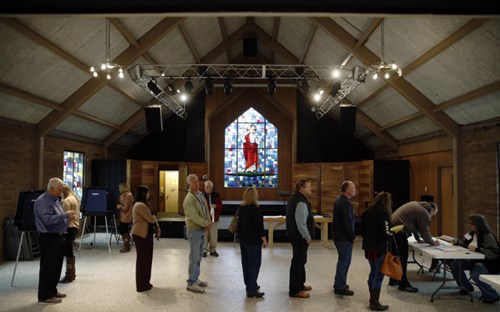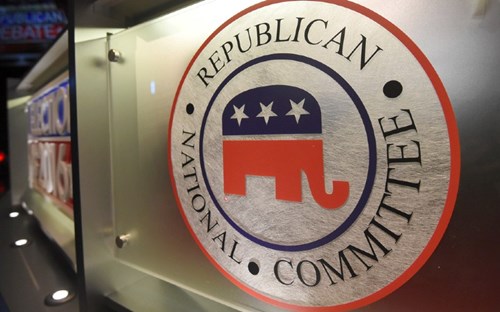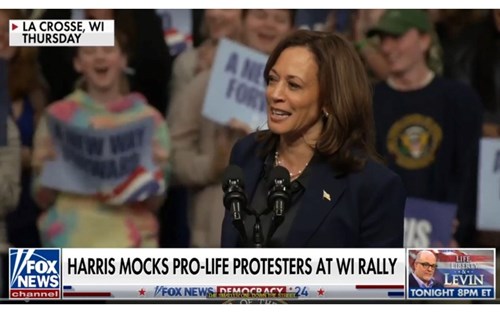Trump carried 31 states and won 312 electoral votes. And roughly a week after Election Day 2024, it's been determined that Republicans also won control of both the Senate and the House. The Associated Press and Fox News both called the House for the GOP Wednesday as nine races remain unresolved. Control of the chamber requires 218 seats. Republicans are there and are leading in at least four more slow-counting districts.
 George Barna, the director of the Cultural Research Center at Arizona Christian University, said on American Family Radio Tuesday that Christians’ impact in the race is being overlooked.
George Barna, the director of the Cultural Research Center at Arizona Christian University, said on American Family Radio Tuesday that Christians’ impact in the race is being overlooked.
While turnout overall was down roughly seven points from 2020, turnout from Christians – a term loosely defined by mainstream media – was three points higher than the 55% overall total for the 2024 election.
“As I look at all the news reports and commentaries and analysts out there in the mainstream certainly, in places where people often go for information, Christians aren’t even part of the conversation in terms of what they did at the polls. I think it’s important to give Christians their due. At least they recognized there was a significant difference between Mr. Trump and Mrs. Harris. That’s good,” Barna told show host Abraham Hamilton III.
And their motivation was?
Barna looked at the exit polling numbers for people who identified as “Christian,” but also dug deeper to look at the group he calls “theologically defined” Christians, or those who say they hold a biblical worldview. It’s the latter group that was particularly motivated to vote, he explained.

“The ones who had much higher turnout rates, for instance, were people with a biblical worldview," Barna continued. "[The] SAGECONS – the spiritually active government-engaged conservative Christians – theologically defined Evangelicals, people who attend charismatic or Pentecostal churches; these were some of the groups that showed up in significantly greater numbers than the rest of the Christian population, which showed up in slightly higher numbers than the population at large,” he added.
Earlier research from Barna’s group indicated that an estimated 41 million Christians, mostly disgusted with their ballot choices, may choose not to vote at all. Other factors cited in a willingness to sit out the election were dissatisfaction with the quality of government and a widespread belief that the results of the election would be manipulated by illegal activities and by the voting of illegal immigrants, Barna said earlier in the fall.
The 'nones' didn't show up for Harris
It’s possible that a grass-roots, door-knocking effort by groups like the Faith & Freedom Coalition changed some minds and got more Christians to the polls. Tim Head, the Coalition’s executive director, said his people surpassed nine million face-to-face contacts urging people of faith to vote.
Before the election, Head thought the group’s efforts could sway more than four million "sit-outs" to get out and vote. At the end of the day, turnout was a big problem for Harris.
“The people whom Mrs. Harris was relying upon – people of non-Christian faiths and people of no religious faith – had below average turnout rates, and that helps to describe why she lost the race,” Barna suggested.
 Another factor in Christian disinterest leading to the election was the Trump-encouraged weakening of the Republican Party platform stance on social issues.
Another factor in Christian disinterest leading to the election was the Trump-encouraged weakening of the Republican Party platform stance on social issues.
Protection of life and the definition of marriage, strongly addressed in previous GOP platforms, were significantly watered down in the revised platform. There was no mention of a need for congressional action on the abortion issue, fetal tissue research, or mention of God bestowing the right to life.
“Mr. Trump, I think, made some bad moves in terms of the party platform … and yet when we looked at our options, I understand where a lot of Christians were coming from. They weren’t excited about voting for him, but we had to keep reminding ourselves we’re not voting for a pastor. We’re not voting for a role model for our grandchildren or our children. We’re voting for somebody who’s going to fight for the policies we believe in,” Barna said.
Barna to GOP: Don’t take Christian vote for granted
The election turnout data should make Christians, largely ignored on abortion, a group for Trump to consider in policy decisions. Barna argued that with 78% of the vote coming from Christians, “that gives us the opportunity to have discussions with him and his Cabinet members and his key leaders to talk about what’s important to us and why we put him into office.”
 Barna recalled that in the midst of a pre-election rally, Vice President Harris encouraged Christians to leave. “Clearly she wasn’t going to be on our side when it comes to moral and spiritual matters,” he said.
Barna recalled that in the midst of a pre-election rally, Vice President Harris encouraged Christians to leave. “Clearly she wasn’t going to be on our side when it comes to moral and spiritual matters,” he said.
In summary, the Christian vote played a major role in Trump winning a second term – but Barna warned it’s not a group the GOP should take for granted moving ahead.
“We’re going to have to be pretty aggressive in terms of letting him and especially the Republican Party know, ‘Okay, we came in on this one, but if you take a step back from the things that are important to us, don’t count on us being there the next time. Maybe we will, maybe we won’t. We’re not a given. Don’t take us for granted, because we’re not quite sure yet where this ship is headed.’”














